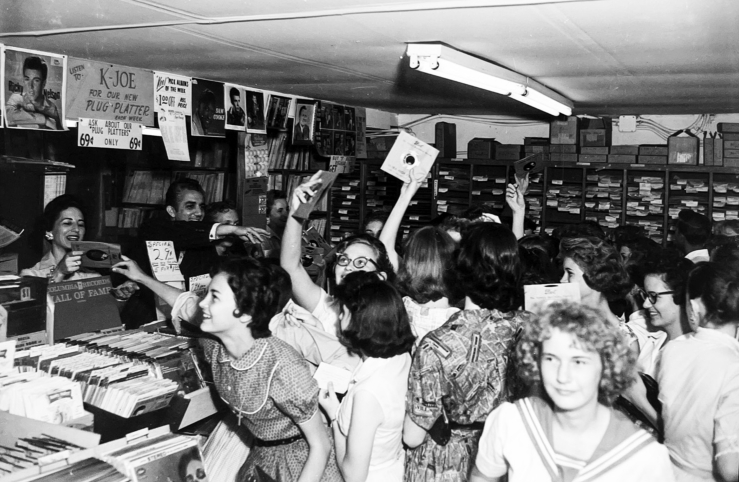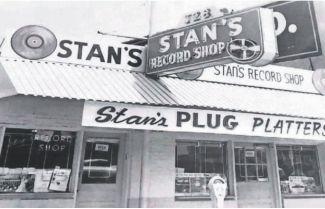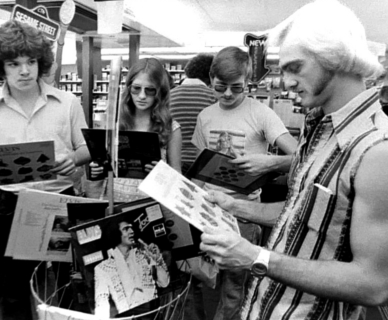Stan the Record Man

Twin Blends Photography combined the old and new in this digitized image.
Remembering an icon and his legacy
Images courtesy of Twin Blends and the Northwest Louisiana Archives at
iTunes. Pandora. Downloads. Apps.
Those are just some of the ways many of us — especially the young folks — listen to music these days.
But back in the day, if you lived in Shreveport-Bossier or the surrounding area and wanted to buy a song, you went to see one person.
Stan the Record Man. “Around here, he was the founding father of the music industry because he started everything,” remembers Lenny Lewis, Stan’s son. “He was involved in wholesale, retail, recording labels — everything. Daddy was pretty big. All over the United States, he was in the top five, and around here, he was No. 1.”
Stan Lewis, a member of the Louisiana Music Hall of Fame, died in 2018 at age 91. In 1948, he opened his first retail store — Stan’s Music Shop — at the corner of Texas and Common Streets.
“Leonard Chess had Howlin’ Wolf, Muddy Waters, Etta James — all the big Black artists,” Lenny said. “He was traveling in the South and would sell records out of the trunk of his car. He convinced my dad that this was going to happen — selling records.”
Stan — and his wife, Pauline — bought in.

Going way, way back when 45’s were all the rage.

Meet the Lewis family, 1956: Stan, Pauline, Lenny and Susan Lewis.
“They put 45s in crates and sold them.
Leonard would come through Shreveport once a month and bring whatever he was selling. His friends realized Daddy was doing a good job. People were coming in from Minden, Springhill — those kinds of places. It just got bigger and bigger. That’s how Daddy decided this thing is coming — this thing called the music business.”
It got so big, Stan had as many six stores. “He always wanted to open a retail store wherever a new mall was opening. He always believed if you have stores for people’s convenience, then (competitors) wouldn’t come into the city. … To fight the competition, he would open a new store. Mall St. Vincent, Mackey Lane by South Park Mall, 70th Street — wherever there was something new opening, Daddy believed to stop the competition, you opened up your own stores.”
Stan also had several record labels, signing singers like Randy Travis (who back then went by Randy Traywick), Charlie Daniels and Mickey Gilley.
“You’re always looking for new talent.
Always. He signed John Fred and the Playboys [“Judy in Disguise”]. The Uniques were from Springhill. People wanted to sign, and Daddy just happened to be here.”
“Daddy” also just happened to become friends with two of music’s biggest entertainers — Elvis Presley and Wayne Newton.
“They respected him a lot.” Stan and Elvis got to know one another when Elvis, in town to perform on the Louisiana Hayride, would shop at Stan’s store.
“Elvis would come into town on a Friday and go have breakfast on Saturdays with my dad at the Washington Youree Captain Shreve Hotel. Every Saturday. They became really, really good friends. He could get in touch with Elvis until about five years before Elvis’ death. Daddy would take him to the Louisiana Hayride to perform. I’ve got tons of pictures of him and Elvis together.”
Their friendship lasted well into Elvis’ career.
“We would go to Vegas, we would go to his shows, and they would put us on the front row. [Elvis] would stop the show and say, ‘I want to say hello to some friends from Shreveport, Louisiana — Stan, Pauline, Lenny and Susan.’ Then, he would take off a scarf and hand it to my momma and my sister.”
How good of friends were Stan and Newton?
“My momma and daddy stayed at Wayne Newton’s house in Las Vegas.”
Stan’s Record Shops closed in the late 80s, the victim of what Lenny says was music piracy.
“Our artists were complaining about people making CDs on the side of the road.
We would sell 30 good CDs to a store, and we would never get a reorder. I kept telling my dad, ‘Something’s not right.’ They were making them in a back room, taking the good ones we sold and mixing them in. I called the FBI, but I got no help from anybody. It was just a sign of the times.”
Lenny worked with his father and saw firsthand how important Stan was to the music industry. But Lenny wishes Shreveport would do something to honor his dad for all he did.

Above is an old photo from Stan “the Record Man’s” hallway (unattributed).

Stan’s was a 70s hotspot in downtown Shreveport.
“Who is Lead Belly? Most people say, ‘Who is that?’ They’ve got a statue of Lead Belly. My dad was so instrumental in putting Shreveport on the map as far as music, was involved in the Louisiana Hayride, in wholesale and distributing and in labels. There’s nothing here on the corner of Texas Street. Everybody just tore our buildings down.”
Lenny believes his father was not only a successful businessperson but an ambassador for the city.
“You go anywhere in the United States, and they know Stan’s Record Shop, Shreveport, Louisiana. You can’t say that for any other little companies in Shreveport. I’m not just bragging on my dad. I’m just being honest. I think Shreveport should have honored him with something — a plaque or something, right there on the corner. Maybe I’m wrong. Maybe it’s not a big deal to anybody but us. But we think Daddy deserved that.”
